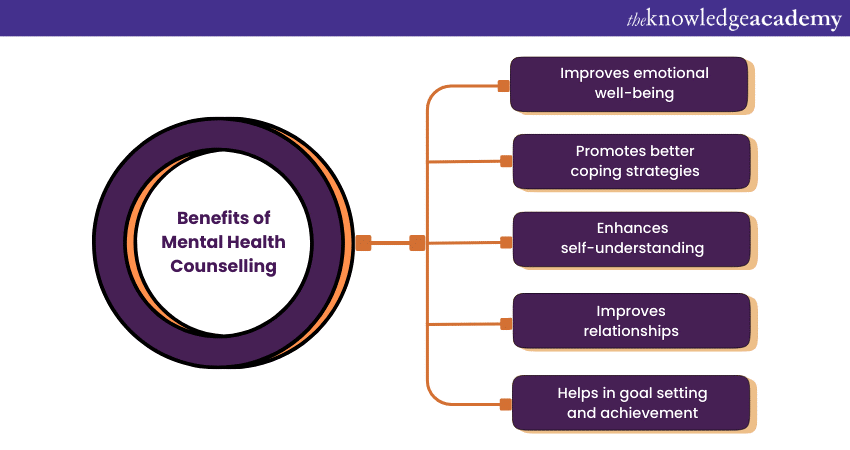Some Known Factual Statements About Mental Health Counseling
Some Known Factual Statements About Mental Health Counseling
Blog Article
About Mental Health Counseling
Table of ContentsThe Mental Health Counseling DiariesThe Buzz on Mental Health CounselingThe Definitive Guide for Mental Health CounselingThe Definitive Guide for Mental Health CounselingThe 10-Second Trick For Mental Health Counseling
Through therapy, you can get understanding into your own patterns of behavior and interaction, which can result in even more meeting and pleasing relationships with friends, family members, and romantic partners. What we believe, we show up. If you're taken in with unfavorable feelings and negative ideas that are conflicting with your life, therapy can aid.Like our thoughts, often our actions come to be destructive. They can keep us from living a favorable and healthy lifestyle. Possibly you fight with dependency, or you have a tendency to self-sabotage, or there are various other unfavorable methods you behave. Mental Health Counseling. Therapy can assist you alter those habits that are having a negative effect on your globe and relationships.

The relevance of therapy exceeds your mental health and wellness. Obtaining treatment to deal with particular elements of your life can assist you be a lot more effective in other locations, including work. Some research study has actually even revealed that there's a direct relationship in between seeking mental health and wellness assistance and a reduction in missed work.

About Mental Health Counseling
There are also a lot more benefits of treatment than simply the ones we have actually discussed., or develop partnerships (romantic or those with family members or good friends) in a healthy and balanced means.
For the objective of the here and now research study, viewed advantages and obstacles to psychological wellness help-seeking are being discovered. Previous research located that regarded obstacles have a considerable effect on university student' health and wellness behavior options (Von Ah, Ebert, Ngamvitroj, Park & Kang, 2003). Perceived benefits and barriers to help-seeking were specifically selected because of their influence on decision-making and ultimately activity (Glanz, Rimer, & Su, 2005).
Today research study looks for to take a look at whether or not preconception acts as an obstacle to treatment amongst university pupils. Eisenberg et al. (2011) suggested that uncertainty about treatment effectiveness is another obstacle to joining treatment. Research study findings exposed that university student endorsed several obstacles to taking part in treatment. Mental Health Counseling. Amongst these were: (1) favoring to deal with mental wellness problems themselves, (2) not having sufficient time to join treatment, (3) inquiries regarding whether mental wellness treatment works in remediating issues, (4) an idea that anxiety is regular or the issue will improve without treatment, (5) lack of money, and (6) fret concerning what others would believe if they learnt about therapy engagement.
(2006) reported comparable variables as obstacles to looking for treatment and likewise located that a skepticism description of providers might restrain students from looking for help. Team in school mental wellness facilities might be regarded as hostile, and long wait times for solutions might be "repulsive" for pupils. Variables promoting extra favorable perspectives are commonly at the opposite pole of those aspects identified as obstacles.
More About Mental Health Counseling
One in 3 (34.6%) reported living on university and one in four (23.3%) reported coping with moms and dads. Virtually fifty percent of students were associated with school organizations and 1 in 10 reported remaining in a fraternity or sorority. Greater than one-third of pupils (38.1%) reported that they had a relative or good friend with a diagnosed psychological health problem.

Some Of Mental Health Counseling
Univariate F-tests recognized specific subscale products that dramatically varied. Ladies were much less most likely than males to perceive people that go to therapy as emotionally weak, people who go to counseling as crazy, to feel that people with psychological illness must deal with issues by themselves, that individuals that go to therapy as not able to resolve problems, that click this site individuals who go to therapy are careless, and to feel that individuals that most likely to therapy are various from regular individuals in an unfavorable method.
Similarly, research study results revealed that females were considerably less most likely than males to hold stigma-related attitudes. This follows previous research which also located that men hold higher levels of regarded preconception than women (Chandra & Minkovitz, 2006). Based on study searchings for, it is apparent that males may be much less most likely than ladies to seek therapy due to reduced perceived obstacles along with high stigma-related perspectives.
Mental Health Counseling - Truths
Additionally, university health specialists may supply curricula targeting males with information on the benefits our website of mental wellness therapy and the importance of looking for help when required. All approaches need to be reviewed with future research to determine the impact on university student, especially men. As opposed to general population research studies which disclose that women are most likely to seek psychological wellness services contrasted to guys (Haunstein et al., 2006; Mackenzie, Gekoski, & Knox, 2006), today research discovered no considerable distinctions in the variety of perceived obstacles to help-seeking habits based on sex.
Researchers hypothesize that this is largely as a result of typical social norms and sex functions that identified men based upon stamina and lack of emotional expression (Addis & Mahalik, 2003; Ang, Lim, Tan, & Yau, 2004; Mojtabai, 2007). In general, there have been combined results amongst the university student population regarding sex distinctions (Rosenthal & Wilson, 2008). This finding was unexpected and could highlight that those who had actually received therapy had a far better idea of wait times and other "access" barriers that may make it difficult to begin treatment. Possibly, participants that have gotten therapy view extra barriers than participants who have not gotten therapy because seeking counseling services once again can entail anxiety of self-disclosing individual info to a new counselor.
Report this page